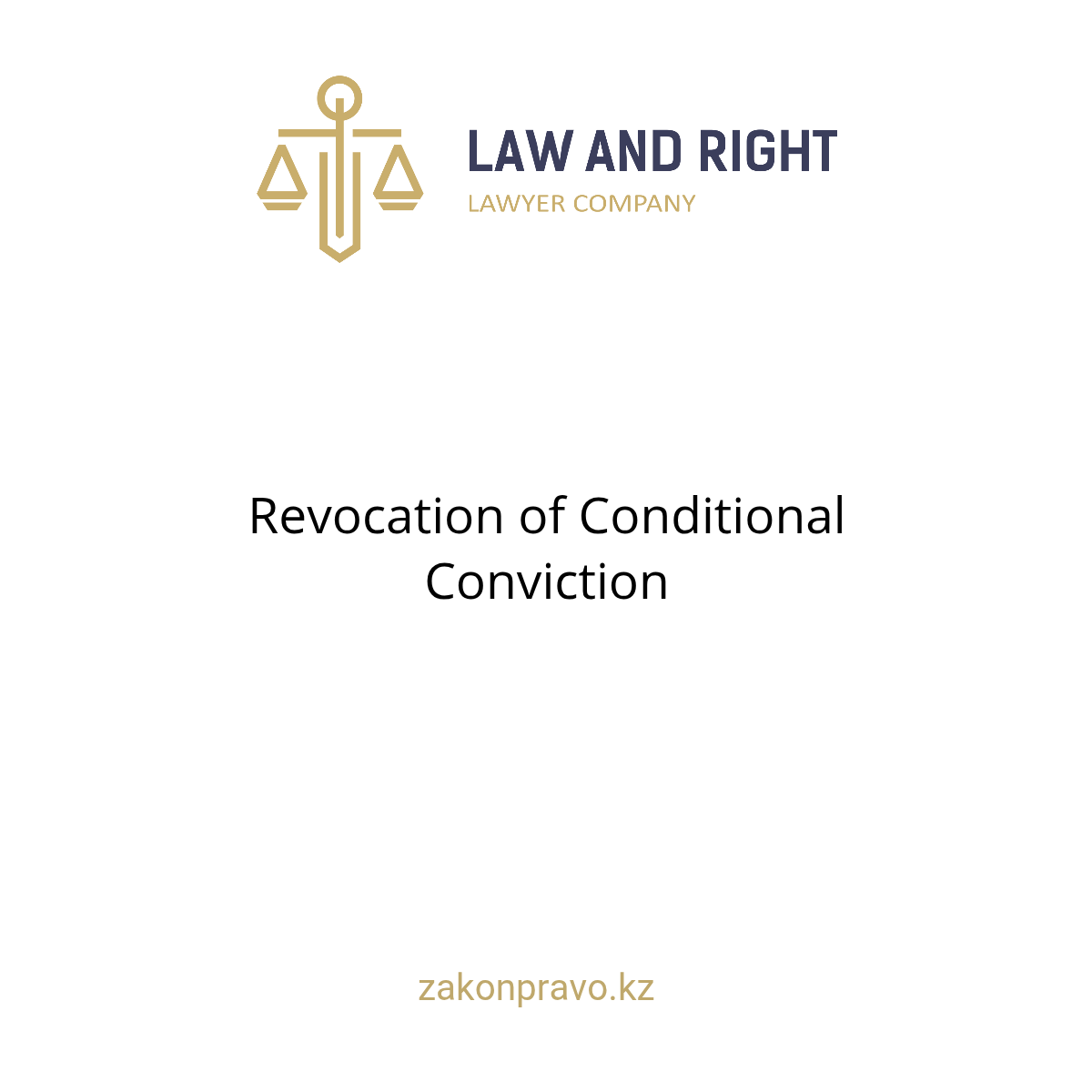Revocation of Conditional Conviction
🔷 1. Legal Essence of the Article
Article 64 of the Criminal Code of the Republic of Kazakhstan (CC RK) regulates the grounds, procedure, and consequences of revoking a conditional conviction. It aims to:
- encourage the convicted person's conscientious behavior;
- respond to violations of the conditions of the suspended sentence;
- balance between the state's trust and the offender's duty to prove rehabilitation.
🔹 The application of this article is closely related to the institution of probation control (Articles 63 and 44 of the CC RK, Law of the Republic of Kazakhstan “On Probation”).
🔷 2. Commentary by Parts of the Article
🔹 Part 1. Early Termination of Conditional Conviction and Expungement of Criminal Record
The court may revoke the suspended sentence and expunge the conviction early if the person's conduct demonstrates rehabilitation.
📌 Conditions:
- at least half of the probationary term must have passed;
- a positive report from the probation authority;
- no violations or administrative offenses.
🔸 Judicial Practice:
A minor sentenced to one year of conditional conviction studied diligently and complied with all instructions. After 7 months, based on the probation officer's report, the court revoked the suspended sentence and expunged the conviction.
🔹 Part 2. Extension of the Probation Term (up to 1 year)
🔹 This is not automatic, but applied based on a submission from the probation authority in cases of minor violations:
| Grounds for Extension | Comment |
|---|---|
| 1) Administrative offenses against public order, morality, family, or individuals | e.g., petty hooliganism, domestic violence |
| 2) Violation of probation conditions | e.g., failure to report, damaging an ankle monitor, moving without notification |
| 3) Committing a criminal infraction | e.g., petty theft, insult |
📌 The court may extend probation by up to one year instead of converting the conditional sentence into actual imprisonment.
🔹 Part 3. Revocation Due to Systematic Violations
🔸 Applied in cases of:
- failure to fulfill obligations imposed by the sentence;
- repeated violations mentioned in Part 2;
- deliberate evasion of probation control.
🔹 Consequence: the court revokes the suspended sentence and enforces the punishment previously imposed in the judgment.
📌 For minors, a second extension of the probation term is allowed, but not more than one year.
🔸 Judicial Practice:
Citizen X repeatedly violated probation conditions, including failing to appear twice for registration. The court revoked the suspended sentence and enforced the previously assigned 2-year prison sentence.
🔹 Part 4. New Offense – Negligent or Minor Intentional Crime
🔹 In such cases, revocation is at the discretion of the court, which considers:
- the nature of the new offense;
- the offender’s character;
- behavior during the probation period.
📌 Exception for Minors: even if a medium-gravity crime is committed, the court may preserve the suspended sentence due to their status.
🔹 Part 5. New Offense – Medium, Grave, or Especially Grave Intentional Crime
🔸 In this case, the court must:
- revoke the suspended sentence,
- and impose punishment under cumulative sentencing (Article 60 of the CC RK).
📌 Principle: a person who was given a chance but committed a serious new offense loses the trust of the state.
Example:
An individual conditionally sentenced for theft (Art. 188) committed robbery (Art. 192 part 1) during probation. The court revoked the suspended sentence, imposed 6 years for the robbery, and added the previous 2 years — resulting in a total of 8 years of imprisonment.
🔷 3. Interrelation with Other Provisions
| Provision | Content |
|---|---|
| Article 63 CC RK | Conditional conviction |
| Article 44 CC RK | Assignment of probation control |
| Article 60 CC RK | Cumulative sentencing |
| Law of RK “On Probation” | Rights and duties of convicts, powers of probation officers |
| Article 85 CC RK | Compulsory educational measures (for minors) |
| Articles 55, 56 CC RK | Mitigating and aggravating circumstances |
🔷 4. International Standards
🔹 UN Standard Minimum Rules for Non-custodial Measures (Tokyo Rules):
- revocation of conditional conviction is an extreme measure;
- priority should be given to rehabilitation.
🔹 ECtHR, Case of Khodorkovskiy and Lebedev v. Russia:
- violations of suspended sentence conditions must be justified and reasoned;
- any substitution with actual punishment must be foreseeable and fair.
🔷 5. Conclusion
Article 64 of the CC RK reflects a balanced approach between restoring justice and offering a second chance:
🔸 It allows:
- encouraging the offender's positive behavior,
- ensuring proper conduct under probation,
- ensuring accountability in case of recidivism or violations.
🔹 At the same time, minors are given more flexibility and protection, as a more vulnerable category.
Attention!
Law and Law Law Law draws your attention to the fact that this document is basic and does not always meet the requirements of a particular situation. Our lawyers are ready to assist you in legal advice, drawing up any legal document suitable for your situation.
For more information, please contact a Lawyer / Attorney by phone: +7 (708) 971-78-58; +7 (700) 978 5755, +7 (700) 978 5085.
Attorney at Law Almaty Lawyer Legal Services Legal Advice Civil Criminal Administrative Cases Disputes Protection Arbitration Law Firm Kazakhstan Law Office Court Cases


